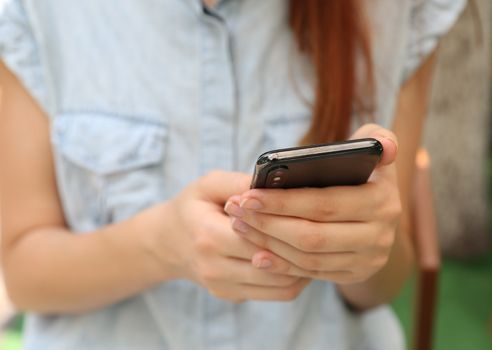Reading time: Less than 1 minute
This is my weekly installment of “writing about writing,” in which I scan the world to find websites, books and articles to help other writers. Today I discuss two posts about how to make smart use of your smartphone….
See the photo at the top of this post? The young woman pictured appears to be holding her phone in a death grip. You can see her clenched fingers and her slight lean forward. “I might be missing something,” you can almost hear her thinking.
Are you like that with your phone?
I’ve been thinking about smartphones recently after reading two articles in the media. One, from The New York Times ran under the headline “How to Turn an iPhone Into a Work-Only Tool.” The other, from the Globe and Mail carried the header, “Why buying a dumbphone was a smart decision.” But both argue the same point: If we don’t control our phones, they will control us.
Conor Dougherty, who writes about economics for the Times, has pared down his phone so that it carries only news and books. Here’s how he describes his decision:
“I cover California and the economy and have to read news for work, so the mental bargain I’ve made with myself is that I can use my phone as much or as long as I want — so long as I’m reading books or news. Aside from news, Audible, and service-type things like maps and airline apps, I have nothing on my phone. I even disabled the browser. I find this keeps me mostly sane and mostly productive.”
Randy Boyagoda, a writer and professor of English at the University of Toronto, however, has made an entirely different call. He’s switched to what he likes to call a “dumbphone.” It’s a Punkt MP02, and it has no camera and no apps.
As Boyagoda puts it, “when I actually need to, [I can] go online by tethering a laptop to its built-in modem. The phone is small and black and sturdy. It looks like James Bond’s calculator, circa 1985. When people see it, they respond with eye-rolling disgust (my kids), confusion, surprise and irony.”
This issue of smartphones is particularly important for writers, many of whom claim they don’t have enough time to write. Like the scolding teachers of the 1960s and ’70s who used to ask us how much TV we were watching, I’m going to ask you how much time you’re spending on your phone.
As for me, of course I have a smartphone but I don’t have any social media apps installed, so I can’t use them there. I have email but I’ve stored in on the third page of my apps so that I have to switch pages to view it, which makes me think about whether I really need to use it. Most of the time, my answer is no, so I don’t.
If you want to find more time in your life, figure out how you can use your smartphone more smartly.
An earlier version of this post first appeared on my blog on Sept. 9/19.


